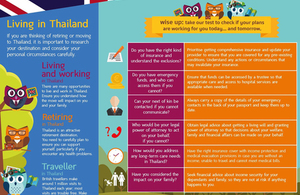Living in Thailand and uninsured?
The British Embassy Bangkok issues warning about living in Thailand without adequate insurance.

Living in Thailand
Thailand has long been a popular holiday and retirement destination for foreign nationals and, according to Thai Immigration Statistics, is home to around 55,000 Brits, including more than 10,000 retirees; this figure has grown by 45% since 2011.
The consular team at the British Embassy Bangkok is one of the busiest globally and supports hundreds of British people facing problems in Thailand every year. Over half the help we provide is related to deaths or hospitalisations (Helping British nationals abroad 2014/2015 report).
The cost of some medical treatment in Thailand is comparable to that of private medical care in Europe, and many people are putting themselves at risk of high medical bills by living here uninsured. Based on British Embassy figures in 2015, more than 80% of British residents in Thailand over the age of 51 who received consular assistance after being hospitalised did not have medical insurance, despite the relatively common need for medical care. Many British nationals living in Thailand mistakenly believe that they can automatically access free medical care if they return to the UK: this is not guaranteed.
Layla Slatter MBE, HM Consul to Thailand said:
Many British people understandably choose to spend their retirement years in warmer climates, and Thailand is one of the world’s top tourist and retirement destinations. Medical treatment can cost thousands of pounds and returning to the UK may not be an option for everyone. In many cases there will be a direct financial impact on friends and family. The British Embassy Bangkok endeavours to work with charitable organisations and do everything we can to help people, but we cannot pay medical bills or fly people home. This is why we encourage people to make provision for their health and medical needs when choosing to live abroad, as it is the most reliable way to ensure that costs can be covered.
Before making decisions about living or retiring in Thailand, you should research and make plans for your long-term care needs. Our provides some helpful hints and advice about preparing to live in Thailand.
What can the FCO do for people who have problems when living or travelling abroad?
The FCO can:
- Issue you with an emergency travel document
- Provide information about transferring money
- Provide help if you have suffered rape or serious sexual or physical assault, are a victim of crime or are ill or in hospital
- Give you a list of local lawyers, interpreters, doctors or funeral directors
- Contact you if you are detained abroad
- Contact friends and family at home for you if you wish
- Provide help in cases of forced marriage
- Assist people affected by parental child abduction
The FCO cannot:
- Help you enter a country if you do not have a valid passport or necessary visas
- Give you legal advice or translate documents
- Investigate crimes or get you out of prison
- Get you better treatment in hospital or prison than is given to local people (but we will raise concerns if treatment falls below internationally recognised standards)
- Pay any bills or give you money
- Make travel arrangements for you
Further information:
Follow British Ambassador Mark Kent on twitter @KentBKK